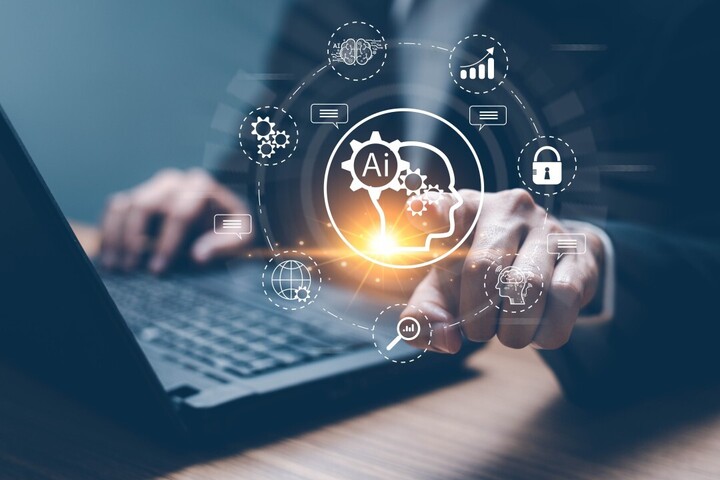In recent years, artificial intelligence (AI) has emerged as a transformative force, revolutionizing various industries and reshaping the way we interact with technology. One area where AI has made significant strides is web applications. By incorporating AI technologies, web applications can enhance user experiences, streamline processes, and provide intelligent insights. In this blog, we will explore the vast potential of Artificial Intelligence in web applications, examine key AI techniques and their applications, along with discussing the benefits and challenges.
We build digital products to help businesses succeed!
Introduction to AI in Web Apps: Significance Explained
AI in web applications refers to the integration of intelligent algorithms and techniques to enhance the functionality, interactivity, and efficiency of web-based systems. AI can enable web applications to perform tasks such as natural language processing, machine learning, computer vision, recommendation systems, and more. By leveraging AI, web applications can provide personalized experiences, automate complex processes, and extract valuable insights from user interactions and data.

Integrating AI into Web Development: What’s the Process?
Define Clear Objectives
Clearly define the objectives and use cases for integrating AI into web applications. Identify areas where AI can provide the most value and align them with business goals and user needs.
Quality Data Collection
Ensure the collection of high-quality, diverse, and representative data for training AI models. Implement data collection mechanisms and data governance practices that adhere to privacy regulations and ethical considerations.
Collaboration Across Disciplines
Foster collaboration between software engineers, data scientists, domain experts, and UX/UI designers to ensure seamless integration of AI into web applications. This interdisciplinary approach ensures that AI technologies are effectively applied to address specific challenges and deliver optimal results.
Regular Model Monitoring and Updates
Continuously monitor AI models integrated into web applications to ensure their performance, accuracy, and relevance. Regularly update and retrain models to accommodate changing user behaviors and evolving data patterns.
Ethical Considerations and Transparency
Prioritize ethical considerations, such as fairness, transparency, and user privacy, when integrating AI into web applications. Make efforts to provide explanations for AI-generated outputs, allow user control over AI features, and implement measures to mitigate biases and discrimination.

Challenges of AI Integration in Intelligent Web Applications
Data Quality and Availability
AI algorithms rely on high-quality data for training and inference. Obtaining clean, diverse, and labeled data can be a challenge, requiring data preprocessing and curation efforts.
Ethical and Privacy Concerns
AI-driven web applications may handle sensitive user data, raising ethical and privacy considerations. Safeguarding user privacy, ensuring transparency, and addressing biases and fairness are vital aspects of responsible AI implementation.
Technical Complexity and Expertise
Integrating AI into web applications requires specialized knowledge and expertise. Developing and deploying AI models, optimizing performance, and managing computational resources can be technically challenging, necessitating skilled AI engineers and software developers.
User Acceptance and Trust
AI-powered web applications must earn user acceptance and trust. Ensuring transparency, explainability, and user control over AI-driven functionalities can alleviate concerns and foster user confidence in the system.
Key AI Techniques in Artificial Intelligence
Natural Language Processing (NLP)
NLP enables web applications to understand and process human language. AI-powered chatbots and virtual assistants can interact with users, provide support, and respond to inquiries in a conversational manner. NLP also facilitates sentiment analysis, language translation, and text summarization, enhancing the way users interact with web content.
Machine Learning (ML)
ML algorithms empower web applications to learn from data and make intelligent predictions or recommendations. In e-commerce, ML-based recommendation systems analyze user preferences and behaviours to offer personalized product suggestions. ML models can also be used for fraud detection, customer segmentation, and predictive analytics, improving decision-making and user satisfaction.
Computer Vision
Computer vision techniques enable web applications to understand and analyze visual content, such as images and videos. This technology finds applications in areas like object recognition, facial recognition, image captioning, and visual search. Web applications with computer vision capabilities can offer visually enriched experiences, enhance security, and simplify content retrieval.
Intelligent Automation
AI-powered web applications can automate repetitive tasks, improving efficiency and productivity. Automated data processing, content generation, and workflow management can reduce manual efforts and free up valuable resources. AI-driven process automation can streamline various web application functions, from form filling and document processing to data extraction and analysis.
Benefits of AI in Web Applications
Enhanced User Experience
AI enables web applications to deliver personalized and tailored experiences to users. From personalized recommendations and search results to chatbots that provide instant assistance, AI can create engaging and customized interactions, increasing user satisfaction and loyalty.
Improved Efficiency and Productivity
By automating routine tasks and providing intelligent insights, AI boosts efficiency and productivity in web applications. This allows businesses to allocate resources effectively, streamline operations, and focus on high-value activities.
Intelligent Insights and Decision-Making
AI algorithms can analyze vast amounts of data and extract valuable insights. Web applications powered by AI can provide real-time analytics, predictive analytics, and data-driven recommendations, empowering businesses to make informed decisions and gain a competitive edge.
Scalability and Adaptability
AI techniques enable web applications to adapt and scale based on user demands and changing business needs. ML models can continuously learn and improve over time, ensuring that web applications remain relevant and effective as user requirements evolve.
Future of Artificial intelligence in Web Applications
Augmented Intelligence
The future of AI in web applications lies in augmenting human capabilities rather than replacing them. Web applications can leverage AI to enhance collaboration, decision-making, and problem-solving, providing users with intelligent tools and insights that complement their expertise.
Voice-Enabled Interfaces
Voice assistants and voice-activated commands are becoming increasingly popular. Integrating voice-enabled interfaces into web applications can enable hands-free interactions, improve accessibility, and enhance user convenience.
Edge AI
With the proliferation of IoT devices and the need for real-time processing, edge AI will gain prominence in web applications. Running AI algorithms on edge devices reduces latency, enhances privacy, and enables AI capabilities even in resource-constrained environments.
Conclusion
The integration of artificial intelligence in web applications has the potential to transform user experiences, improve efficiency, and enable data-driven decision-making. From personalized recommendations and intelligent automation to enhanced customer support and healthcare solutions, AI empowers web applications to deliver enhanced functionality and intelligence. However, it is crucial to address challenges such as data quality, ethical concerns, technical complexity, and user acceptance. By following best practices and leveraging AI responsibly, web developers can harness the power of AI to create innovative and impactful web applications that cater to the evolving needs of users in the digital age.
Now that you’ve learnt all about AI and web applications, are you ready to take your business to the next level? With our in-house tech experts, we at Primathon offer outstanding AI in web applications services that can help you in this journey. Join us today and we ensure you have no worries about your future!
Offices
India
86P, 4th Floor, Sector 44, Gurugram, Haryana 122003Singapore
#21-02, Tower 2A, The Bayshore condo, Singapore 469974Canada
8 Hillcrest Avenue Toronto ON M2N 6Y6, CanadaUS
31 River CT, Jersey City, New JerseySubscribe to our newsletter
Our Services
Top Reads
India
86P, 4th Floor, Sector 44, Gurugram, Haryana 122003
Singapore
#21-02, Tower 2A, The Bayshore condo, Singapore 469974
Canada
8 Hillcrest Avenue Toronto ON M2N 6Y6, Canada
US
31 River CT, Jersey City, New Jersey
Contact us
info@primathon.in
+91-9205966678
Reviews


